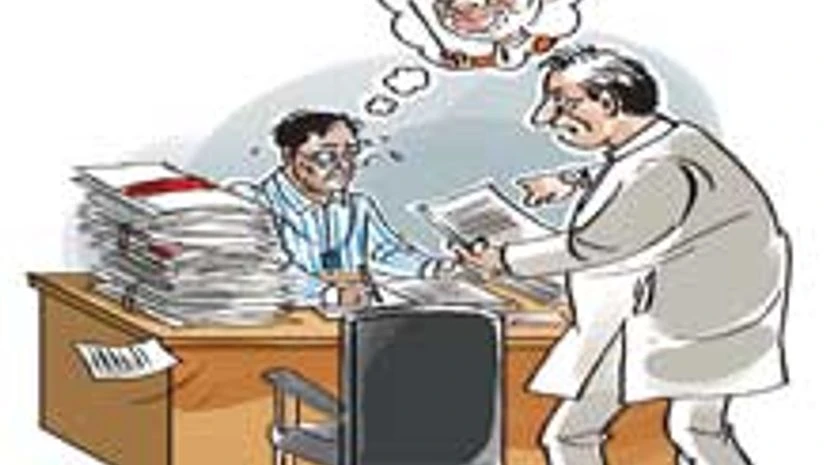"I do not handle these issues; I cannot be doing their work every time," yells a bureaucrat, returning a file that landed on his table after being shuttled from one desk to another in his ministry. He had once in the past agreed to work on a similar issue to help a colleague but not any more. His equation with that colleague has not changed. What has is the government at the Centre, and with that, the work load.
Prime Minister Narendra Modi's efforts to speed the government's decision-making process have begun to show - at least as strains on bureaucrats' brows. True, they are not scared of taking bona fide decisions any more. But many are finding it difficult to keep pace with Modi's working style - from long work hours to faster clearance of files, it is a telling tale in the corridors of power.
As the orders from the top now require ministries to move Cabinet notes faster, nodal ministries give little time for inter-ministerial consultation. So, deadline pressures affect the quality of notes as well. In fact, on receiving some below-standard ones, Cabinet Secretary Ajit Seth recently wrote to ministries to ensure these were free of defects.
Also Read
"The nodal ministry sometimes asks for a file in two hours. How is one to analyse a proposal from every angle in such a small time? You have to look at it from various standpoints - financial implication, technical specifications, better ways of doing it," rues an official, struggling to explain his side of the story to this reporter, even as he juggles with incessant phone calls.
According to guidelines, government departments are required to send comments to their administrative ministries within 15 days of receiving a draft Cabinet note. This time is necessary, given that the note has to move from the under secretary to director, joint secretary, additional secretary and then the secretary, with each giving his or her comments.
"Besides routine files, I have cleared 48 Cabinet notes in the past three months. That would mean about two days for one note," says the official quoted above, stealing a glance at another proposal that has just landed on his table, again with a short clearance deadline.
As many ministers and senior bureaucrats try to impress the prime minister with their ability to move things quickly, they sometimes build pressure on others by dropping names. Lines like 'the PMO is asking for it' or 'the Cabinet secretary wants it early' are used whenever needed. "Since you cannot short-circuit the procedure, the quality is bound to suffer," says another official.
In many cases, say officials, the notes are for small proposals, of little consequence to the economy but helping some people prove themselves before their bosses. Some of the Cabinet notes are of more than 30 pages. What do over-burdened bureaucrats do in such a situation?
"In such a scenario, I will have no option but to scuttle the proposal, else there is one Mr Ranjit Sinha (CBI director) who might come after me. On some occasions I stood up and said it would take at least four days," says the first official.
The problem gets magnified as some departments are under-staffed and proper infrastructure is not in place. Most section officers and under secretaries share office space and peripherals like printers. Even the officers of the director rank are often seen haggling with their administrative departments to provide them with a car for an official meeting outside.
"Saying it is one thing and doing is another. You need to put an enabling ecosystem and take concrete actions," suggests a director with a key economic ministry.
However, not everyone is complaining. Some bureaucrats, particularly those higher in ranks, feel more empowered now. So, they are embracing the change.
"You have to keep three important things in mind - do it quickly, do not make mistakes, and make it presentable. The key lies in how you strike the right balance. These are the things we were taught in the Indian Administrative Service training academy. But these are being reiterated only now," says an official of the additional secretary rank. This official agrees that the new prime minister is focusing on bureaucratic reforms, but adds it might be a while before a section of the civil service catches up with the speed.
| THE COST OF SPEED |
|
Officials say in many cases the notes are for small proposals that are not going to have a great impact on the economy but help some people prove themselves before their bosses

)
